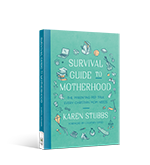
Sign Up for Updates
Connect
TOPICS
- Latest Blog
- Fiction
- Inspirational/Devotional
- Men's Christian Living
- Prophecy
- Women's Christian Living
- View All
ARCHIVES
Why Should You Care About the Creation Story?
Posted on Oct 08, 2018 Topic : Men's Christian Living, Women's Christian Living
Posted by : Danielle Hitchen

The first chapters of Genesis are often encountered by adults as a controversial text about the age of the earth or the design of human sexuality, or we skip over the pre-fall story altogether and jump straight to what we learn about temptation and sin. While there are important things to be gleaned from those discussions, more and more I find myself realizing the creation account is essential to our understanding of how to live in the “already” and what we long for in the “not yet.”
These verses offer a unique glimpse into what human life was designed to be before the intrusion of sin; the same things we should expect for our lives after death. There is sometimes a temptation to think of our bodies as shells to be discarded in death as we float off to an entirely new and utterly other place we call “heaven,” but traditional Christian eschatology affirms that we look forward to a bodily resurrection and living a restored life enjoying the new heavens and the new earth.
If we likewise affirm this is true, we have every reason to believe that the things which preexist sin—our bodies, relationships, work, and rest—are all essential to human flourishing.
There are huge implications for how we then live in this life as already-redeemed people. God wants us to care about:
Our Bodies
God made our bodies and called them good, therefore our bodies and the bodies of others are valuable and ought to be cared for. This belief should serve as the guiding principle for how we as Christians think about a spectrum of issues—human trafficking, sexual harassment and assault, poverty, mental health, adoption and fostering, fertility issues, and so much more. These issues are complicated and messy, but we should always start with and harken back to our calling to care deeply for the protection and health of the body.
Relationships
It is impossible for humans to flourish outside of community. Instead of making humans solitary creatures designed only for relationship with Him, God also made us to work and live alongside of other humans. Building and maintaining healthy community life through our neighborhoods, churches, schools, and workplaces (among others) is essential to our spiritual health.
Work
God also made us to work and work is good. He didn’t say, “Lie in this leaf hammock and be served by the beasts.” He said “have dominion over all the earth” (Genesis 1:26) and then gifted Adam and Eve with the ability to procreate, cultivate their food, and steward the animals and other natural resources. In this life then, our work (paid and unpaid) is meaningful.
Rest
Finally, rest is required. In fact, it’s called “holy.” God rests once He finishes creating not because He’s tired, but because He’s showing us there’s something sacred in the rhythm of work and rest, in the joy of a job well completed.
As we seek to live out this basic theology in our daily lives, we also model for our children obedience and submission to God’s design for human flourishing. This sort of modeling is essential to encourage children to develop healthy life habits and values—children are far more likely to do what they see, not what you say. Our families are the best place to start cultivating a microcosm of God’s kingdom, learning from the beginning of our world to live into our hope of the end and the restoration of all things.

Read more in From Eden to Bethlehem by Danielle Hitchen and Jessica Blanchard

Read more in Let There Be Light by Danielle Hitchen and Jessica Blanchard

